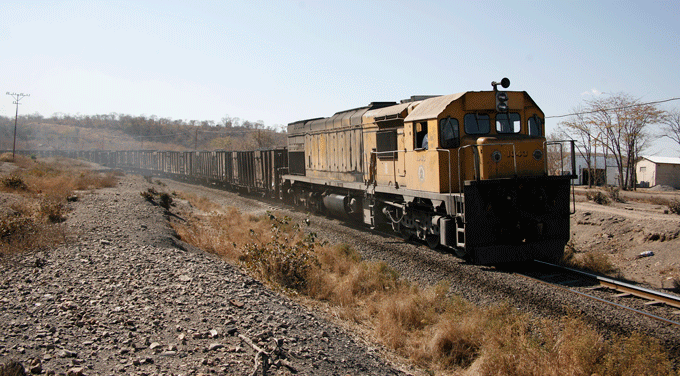
RUTENGA — 17-year-old Zimbabwean, Dayton Murambwi, has never known the inside of a passenger train, nor has he seen one in motion.
Hailing from Rutenga, a growth point in Masvingo province in the country’s southeast, Murambwi, in his fourth year of secondary school education, said he only hears about train stories from elderly people who reminisce about the heydays of this country’s railroad network system.
At his current age, it means Murambwi was born in 2004, at the height of Zimbabwe’s economic crisis, when hyperinflation was picking up, not sparing the country’s railway network system either.
Trains unknown to new generation
“I’ve never seen a moving train. I just see the trains parked and with guards moving around them,” Murambwi said.
What he remembers are stories shared between his father and some elderly people at Rutenga township nostalgic about the good old days when railroad transport was most reliable.
Such is true of many senior citizens like 71-year-old Dumisani Shonani, who said he was a retired railway employee.
“It’s sad that the new generation is not experiencing the good transport service we enjoyed when trains were common some few years back. One could travel on time,” Shonani said.
- Chamisa under fire over US$120K donation
- Mavhunga puts DeMbare into Chibuku quarterfinals
- Pension funds bet on Cabora Bassa oilfields
- Councils defy govt fire tender directive
Keep Reading
State-owned buses have since last year become the sole means of public road transport after the government banned privately-owned commuter omnibuses in a desperate bid to curtail the spread of the coronavirus.
The Zimbabwe United Passenger Company (Zupco) has taken over the transportation of commuters.
But still, it cannot cope with demand and the reintroduced aged trains cannot cope with the pressure either.
Extinction
In fact, Zimbabwe’s railroad transport is riding to extinction even as the government has desperately tried to bring the aged trains back to life to operate under Zupco to save the irate public.
Elivis Mugari, a political activist of the opposition Movement for Democratic Change Alliance, said the defunct trains were a non-starter.
“Remember, these aged trains are only found in Harare and Bulawayo. But they rarely operate because more often than not, they are broken down, and this doesn’t save the situation at all,” Mugari said.
Economy halted trains
A decade ago, commuter trains used to operate before they were halted by the country’s mounting economic challenges in the midst of hyperinflation.
After a landmark Supreme Court ruling in 2015 allowed companies to terminate employment without benefits, the National Railways of Zimbabwe (NRZ) had to dismiss about 600 of its workers to evade the burden of paying wages to the disgruntled workers.
Nevertheless, that has not saved the few remaining commuter trains as the poor economy continued to pummel the aged trains, rendering many of them grounded.
Now, for many commuters here like 27-year-old Helen Mbiriyazvo in Harare, transport woes have remained the order of the day.
“The government just talks, empty talk in fact. And as you may know, the trains are just grounded and very old, and it is very rare to see them moving either, and even if one or two trains may be seen in motion, they are still not enough for us,” Mbiriyazvo said.
No choice
A nurse by profession, Mbiriyazvo and many other commuters in Zimbabwe have no choice.
In line with Zimbabwe’s coronavirus prevention guidelines, the rare trains, as well as Zupco buses and privately-owned buses under the Zupco franchise, are the only mode of transport authorized to ferry passengers.
As a result, they have to bear with long waits at bus terminals waiting for transport.
Mbiriyazvo said she cannot opt for the trains because in reality, they have ceased to exist.
During its heydays, Zimbabwe’s commuter trains used to ferry around 120 000 passengers daily, according to statistics from NRZ.
See no evil
Yet even as commuters like Mbiriyazvo see little or no value added by the so-called return of this southern African nation’s commuter trains, government officials instead brag about the aged carriages.
In September, government spokesperson Ndavaningi Mangwana went on record in the media saying Zimbabwe’s railway lines and trains were some of the very best in the world in terms of comfort and running on time.
But a visit by Anadolu Agency to the grounded train carriages in the capital Harare showed otherwise.
Out of order
The train carriages lack lighting and water, and the toilets are filthy while the signalling and information systems are out of order, with some railway tracks overgrown with grass following years of neglect.
Even so, in 2017, South African logistics group Transnet won a US$400 million joint bid to recapitalize this country’s railroad system, including acquiring and refurbishing train carriages.
Two years later, the same deal was cancelled by the government, blaming the South African company for not providing a viable funding plan.
For now, commuters like Mbiriyazvo just have to make do with the scarce public road transport and the rare commuter carriages.
“There are very few buses to rely on for transport now, but also very rare commuter trains,” she said. — Anadolu Agency










